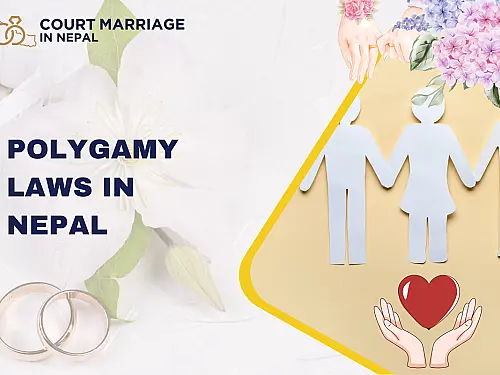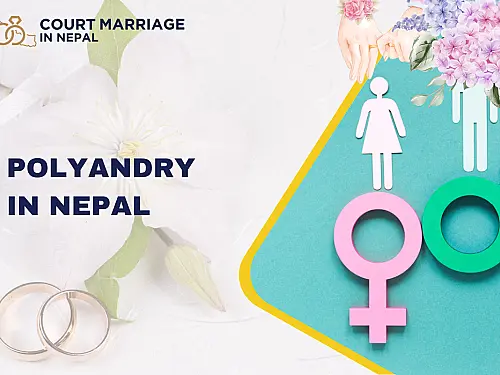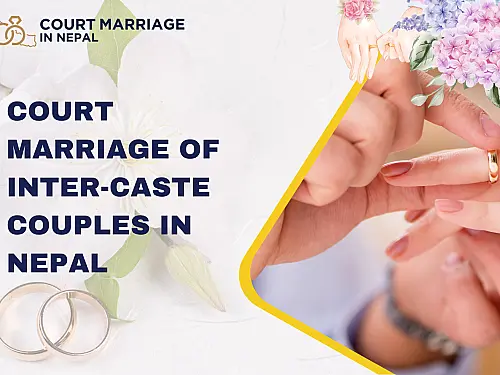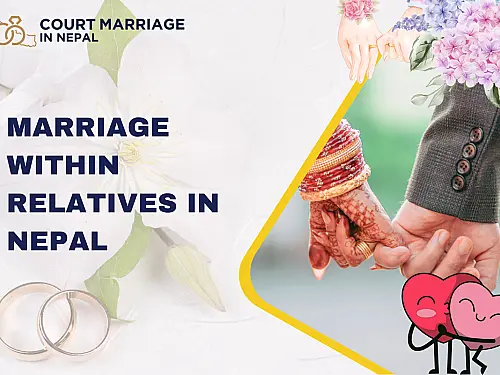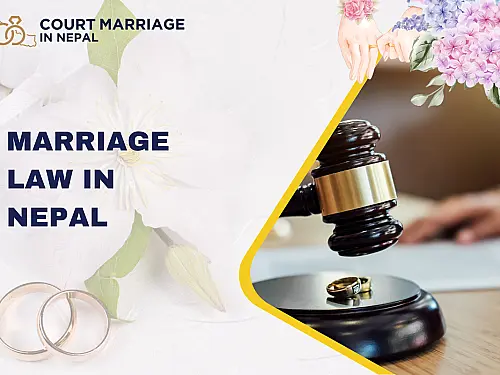Table of Contents
In Nepal, court marriage between a Nepali citizen and a foreign national is a legally acknowledged procedure under the Civil Code 2017. This procedure enables Nepali citizens to marry foreigners and allows two foreign nationals to marry in Nepal, provided all legal criteria are met. The court marriage takes place at the District Court, where the marriage is officially recorded after confirming all essential documents and following the required processes.
This framework guarantees that unions with foreign citizens are acknowledged by Nepali law and offers an official documentation of the marriage. It streamlines international marriages by providing a clear and official procedure via the court. After the court fulfills all requirements, a marriage certificate is provided, which acts as the legal evidence of the marriage. This certificate is crucial for upcoming legal, immigration, and administrative uses both in Nepal and abroad.
Eligibility Criteria For Court Marriage with a Foreigner in Nepal
Age Requirement ( At Least 20 Years Old )
Both parties wishing to marry must be at least 20 years old. This condition guarantees that both individuals are legally acknowledged as adults who can make informed and autonomous choices. The age requirement is consistently enforced for both Nepali and foreign citizens to maintain the standard of legal maturity and consent.
Marital Status (Single, Divorced, or Widowed )
At the moment of registering the marriage, both individuals must be officially unmarried. This indicates they must be either single, officially divorced, or widow. If previously wed, legal documentation of divorce or a former spouse's death certificate must be submitted. This stops bigamy and guarantees that both parties are eligible to enter into a new legal marriage.
Consent (Marriage Should be Founded on Mutual Agreement)
Consent is an essential prerequisite for court marriage. Both individuals must consent to the marriage freely, without any coercion, pressure, or improper influence. In the course of the court hearings, the judge confirms that the choice to marry is consensual and made with complete awareness by both parties, thereby protecting personal liberty and avoiding coerced marriages.
Avoid Incest relation (No Intimate Family Connection Between the Parties )
The couple cannot be closely related by blood, as Nepali law forbids incestuous marriage. This encompasses immediate family and close relatives as defined by legal and cultural criteria. The limitation is established to uphold social standards and genetic well-being, and each individual may need to disclose their family background or submit other proof to demonstrate adherence.
Evidence of Qualification from Foreigner's Country of Origin (Legal ability to marry )
The foreign individual is required to present legal papers typically a single status certificate or a no-objection letter from their embassy that verifies their legal ability to marry according to the laws of their country. This guarantees that the marriage is recognized not only in Nepal but also in the foreigner's country of origin, minimizing the chances of legal disputes or non-recognition internationally.
Required Documents for Court Marriage with a Foreigner in Nepal
For the Nepali Citizen
Certificate of Citizenship
The citizen of Nepal must present their official citizenship certificate that is issued by the Government of Nepal. This document acts as verification of nationality, age, and identity, which are crucial for confirming eligibility according to Nepali law.
Single Status Certificate from Local Ward Office
This certificate is provided by the ward office where the Nepali citizen holds permanent registration. It verifies that the person is currently single, divorced, or a widower, ensuring there are no legal impediments to starting a new marriage.
Certificate of Temporary Residence (if marrying outside of permanent district)
If the Nepali partner is registering the marriage in a district other than their permanent residence, they need to secure a temporary residence certificate from the local ward office where the court marriage is taking place. This demonstrates their legal presence in the region.
For the Foreign Partner
Original Passport containing a Valid Nepal Visa and Notarized Copy
The international partner is required to show their original passport alongside a legitimate visa permitting them to remain in Nepal. A notarized version of the passport is additionally needed for official documentation and validation purposes.
No Objection Certificate (NOC) or Certificate of Single/Divorce Status
This document must be provided by the civil registry, embassy, or consulate of the foreigner's home country in Nepal. It verifies that the foreign partner is legally eligible for marriage and that their home country has no objections to the marriage occurring in Nepal.
Marriage Law of Their Native Country (Translated and Notarized)
The foreign individual is required to provide an official document detailing the marriage laws of their country, translated into Nepali and notarized. This guarantees that the marriage will not conflict with any legal regulations in their home country.
Evidence of a Minimum of 15 days stay in Nepal
A certificate of temporary residence from the local ward office is necessary to prove that the foreign partner has resided in Nepal for a minimum of 15 days prior to the marriage registration. This is a legal residency mandate established by Nepali law for foreign citizens marrying within the nation.
For Both Partners
Two Witnesses possessing Identification Papers
Each individual is required to provide two witnesses during the court marriage procedure. These witnesses need to present notarized copies of their identification documents either a citizenship certificate for Nepali citizens or a passport for non-Nepalese. The witnesses validate the legitimacy of the marriage and the agreement of the parties.
Divorce Decree (if Previously Married)
If either the Nepali or foreign partner had been married before, a certified copy of the divorce decree must be provided. This demonstrates the lawful termination of the previous marriage and qualification for a new one.
Marriage Registration Application Form
The official form for registering marriage needs to be filled out and submitted to the District Court. This document contains information about both individuals, their desire to marry, and affirmations of fulfilling all legal obligations.
4 Passport sized photographs
Both individuals are required to provide four recent passport-sized photos. These serve for documentation, validation, and for attaching to official records and certificates.
These documents are essential to confirm that the court marriage is legally valid as per Nepali law and can be acknowledged in Nepal and in foreign land.
Procedure of Court Marriage
15-Day Residency Condition
Prior to applying for court marriage, the foreign partner needs to remain in Nepal for at least 15 consecutive days. To confirm this, they must acquire a temporary residency certificate from the local ward office in their area of residence. This certificate is crucial for demonstrating that the foreign national has met the residency requirement established by Nepali law.
Assemble and Authenticate Documents
It is essential to gather all necessary documents from both Nepali and foreign partners. This encompasses citizenship certificates, passports, single status certificates, and the marriage laws of the home country of the foreign partner. All foreign documents need to be translated into Nepali and certified by a notary. Correct notarization guarantees legitimacy and approval by the court throughout the validation process.
Application File at the District Court
After all documents are ready, the couple needs to submit the marriage registration application form together with all supporting documents to the District Court in the area where the marriage will take place. This formally begins the court marriage procedure.
Verification and Hearing
The court will assess the presented documents for authenticity and thoroughness. Once verification is complete, a date for the hearing is set. On this date, both partners along with their two witnesses are required to show up in court. At the hearing, they sign a legal paper, which verifies their mutual agreement to marry.
Judge's Approval and Marriage Certificate
If the judge believes that all legal requirements have been fulfilled and that the marriage is founded on mutual agreement, they will formally approve the marriage. Subsequently, the court provides an official marriage certificate, which acts as legal evidence and is acknowledged under Nepali law.
Embassy Verification (Optional)
Although not required, the foreign partner has the option to verify the Nepali marriage certificate at their embassy or consulate located in Nepal. This action aids in confirming that the marriage is acknowledged in their nation, which could be required for immigration or legal reasons internationally. This systematic approach guarantees that the marriage is legally legitimate, recorded, and acknowledged in Nepal and possibly in the foreign partner's country of origin.
Additional information
Time Frame of the Procedure (16–17 Days)
The complete court marriage procedure generally requires about 16 to 17 days. This encompasses the obligatory 15-day stay requirement for the foreign national, along with 1–2 days for gathering documents, translation, notarization, and court processing. The schedule might differ slightly based on how swiftly documents are completed and when a court hearing date is accessible.
Seeking Legal Help is Advised
Although the process can be carried out on one's own, it is strongly advised to consult a legal expert or family law lawyer in Nepal for assistance. A lawyer can help ensure that all paperwork complies with legal requirements, provide assistance with translations and notarizations, and facilitate the court processes effectively reducing delays and the chance of rejection.
Option: Registration at Ward Office for Traditional Weddings
If the couple has already married through a religious or cultural ceremony, they might register the marriage at the local ward office rather than at the court. Nonetheless, for unions that include a foreign national, court marriage is the usual and favored approach for complete legal acknowledgment under both Nepali and international law. The marriage certificate issued by the court is frequently needed for visa, immigration, and embassy matters.
These aspects highlight the significance of organizing, adhering to legal requirements, and selecting the right registration approach according to the couple's situation.
| Requirement | Nepali Partner | Foreigner Partner | |
|---|---|---|---|
| Age | 20 years | 20 years | |
| Citizenship/Passport | Citizenship certificate | Passport with valid visa | |
| Unmarried/Single Status Certificate | From local ward office | NOC/Single status from embassy | |
| Temporary Residence Certificate | If marrying outside district | 15-day stay from local ward | |
| Marriage Law | - | Translated, notarized copy | |
| Photos | 4 passport-size | 4 passport-size | |
| Witnesses | 2 with ID | 2 with ID | |
| Illustration of documents required | |||
Conclusion
In Nepal, court marriage with a foreign national follows a systematic legal procedure regulated by the Civil Code of 2017. It necessitates meticulous planning, precise documentation, and compliance with both Nepali legal regulations and the marriage laws of the foreign partner’s country of origin. To meet the 15-day residency mandate, notarize translated documents, and present witnesses in court, every step must be executed accurately for the marriage to gain official recognition.
Due to the complexities of navigating two distinct legal systems and the necessity for coordination with embassies, it is strongly advised to seek guidance from legal experts well-versed in Nepali marriage law. We can assist couples with paperwork, legal processes, and embassy requirements, minimizing the chances of delays or refusals.
Frequently Asked Questions
At Court Marriage In Nepal, a registered law firm operating as Court Marriage In Nepal Pvt. Ltd., we specialize exclusively in Court Marriage Nepal. As the first law firm in Nepal dedicated to court marriage services, we assist both Nepali citizens and foreign nationals with the court marriage registration process in Nepal, including complete legal support for court marriage registration for foreign citizens in Nepal. As a trusted marriage firm in Nepal and a licensed law firm in Nepal, we ensure a smooth, lawful, and stress-free experience. Contact us today for confidential assistance with court marriage registration in Nepal.


